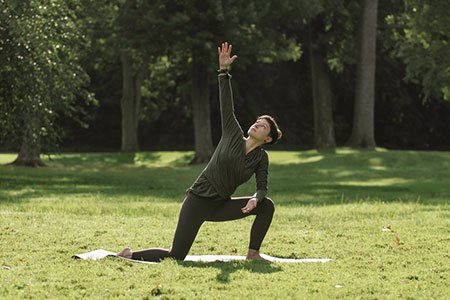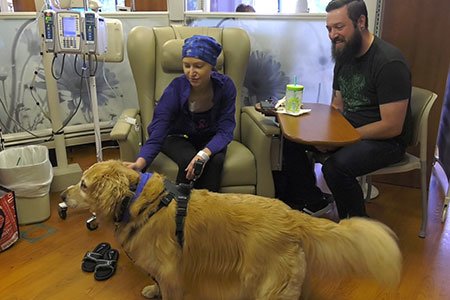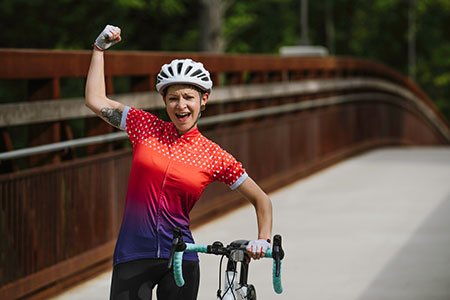Miranda’s story: Love, light and a lump
 Miranda MacKay was diagnosed with breast cancer at just 35 years old. A healthy young woman with no risk factors or family history, she conquered three surgeries, 16 rounds of aggressive chemotherapy, countless needle sticks and a gamut of side effects over the course of a year.
Miranda MacKay was diagnosed with breast cancer at just 35 years old. A healthy young woman with no risk factors or family history, she conquered three surgeries, 16 rounds of aggressive chemotherapy, countless needle sticks and a gamut of side effects over the course of a year.
Through it all, she kept a positive attitude. “I vowed to live my life to the absolute fullest and keep saying ‘yes’ to the things that scare me,” said Miranda.
A career change
In 2018, Miranda left a high-stress job with long hours to start yoga teacher certification.
“I decided that work wasn’t everything. I needed more balance in my life. I find joy in sharing what yoga and meditation can do to benefit everyone, no matter your physical or mental state, beliefs, etc. It helps you cope with our crazy, stressful society,” said Miranda.
After her very first yoga instructor training session, Miranda felt a lump in the shower. Her life was about to change dramatically.
A cancer diagnosis
Miranda’s primary care physician, Grant Lange, D.O., sent her for a mammogram and ultrasound at Henry Ford Macomb Hospital. A biopsy was taken the same day, with a cancer diagnosis confirmed a day later. Miranda had stage 2B invasive ductal carcinoma.
She scheduled an appointment at the Henry Ford Cancer Institute’s multidisciplinary breast cancer clinic at Henry Ford Macomb Hospital, where she and her team spent a half-day devoted to mapping out a clear, coordinated care plan. After a panel of cancer specialists, known as a tumor board, reviewed her case, she was able to meet in one visit with her whole care team, including Laura Dalla Vecchia, M.D., her breast surgeon, and Dawn Severson, M.D., her medical oncologist. Amber Misch, her nurse navigator, became her main point of contact, guide and “hand holder” throughout her cancer treatment.
“It was extremely helpful to work with one person, and not have to leave messages with several different offices. Amber not only handled details, she was someone to talk to and advise me on what steps I needed to take,” said Miranda.

About a month later, Miranda had her mastectomy, followed by 16 rounds of chemotherapy at the hospital’s infusion center.
“It was hard to go to the infusion room as a young woman. Most patients are a different generation -- my grandma’s age. I felt scared, alone and isolated. But the infusion nurses were phenomenal,” recalls Miranda. “They put me at ease and found me a chair that gave me privacy and a window to look out. They joked with me about the different funny or inspirational socks I wore to my treatments. They were warm, reassuring and really helped me through this challenge.”
Miranda’s waist-length hair had been a big part of my persona and “somewhat of a security blanket.” She had considered cutting it before, but now her hand was forced. (Unfortunately, cold capping wasn’t an option for her type of breast cancer.)
“I decided to take ownership and control. I cut my hair to chin length before I started to lose it from the chemo. I felt empowered, but weak,” said Miranda. Her husband Ian shaved her head when it was time.
A support network
Miranda says that being surrounded by a community of family and friends bolstered her strength during treatment. She was humbled and grateful for the outpouring of love she received. Among the most helpful and appreciated gestures was an organized meal train.
“I couldn’t cook or even lift a pan after surgery and Ian was taking care of me. People I barely knew were dropping off coolers on my porch. It gave us time to rest and take care of health concerns. It’s simple things like that, and the family and friends who sat with me during chemo, that made the biggest difference,” Miranda shared.
Despite her positive attitude, there were dark days.
“I did have some ‘Why me?’ spirals…the ugly sobs. But you deal with the ugly and realize ‘This isn’t where I’m going to stay.’ Let yourself wallow for a minute. You have to feel it; you can’t shut it down. Then breathe and go on to what’s next,” recalls Miranda. “My husband helped me develop the tools to pull myself out and not stay stuck. He was the voice on my shoulder for a long time.”
Through it all, Ian was Miranda’s “rock”. “He was with me from day one, committed to seeing me through this fight. When I was diagnosed, he asked me what I wanted and what my goal was. I told him, ‘More time with you. More time living our life together, enjoying adventures big and small.’”
A finish line
Oct. 23, 2018 was Miranda’s last chemo infusion. Thankfully, no radiation was needed. She had reconstructive surgery with plastic surgeon Inad Janineh, D.O. and still gets anti-hormone injections every three months.
Yoga teacher training has been put on hold. She can’t physically return until a year after surgery. She’s set her sights on spring of 2020. In the meantime, she has founded a service offering virtual administrative and development assistance to small business owners.
She now loves her short hairstyle. She cuts, shapes, and styles it to embolden her personality.
Miranda points out that just because her treatments are finished doesn’t mean she can go back to her normal life and forget all she’s been through.
“Cancer changes you forever. Most times I find myself grateful that I can see the life lessons that facing down cancer has taught me. It has made my heart bigger, more open to receiving and accepting love from others,” said Miranda. “It taught me I don't have to do this alone. Cancer woke me up into wanting to live my life with more purpose and less fear.”
What Miranda wants other women to know:

- Young women can, and do, get breast cancer.
- Prioritize yourself. Don’t discount your concerns or worries. “Take ownership of your own health. Don’t worry that you’re bothering someone. Trust your gut; it’s usually right.”
- Asking for help is a sign of strength. “I was definitely a stoic-type person in the past. I didn’t want to share my weakness. I hope that by sharing my story and my vulnerability, it will convince other people that it’s okay to ask for help.”
- Connect with nature. “Being in nature gave me serenity and reassured me that I wasn’t alone in my challenges. It helped me notice the beauty within the world.”
- When you face something scary or challenging, there are always life lessons to be found.
.svg?iar=0&hash=F6049510E33E4E6D8196C26CCC0A64A4)

/hfh-logo-main--white.svg?iar=0&hash=ED491CBFADFB7670FAE94559C98D7798)